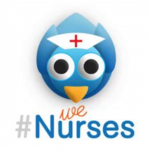
I’ve been a huge fan of WeNurses and all of the other WeCommunities for ages. For those of you who haven’t heard about them before, they are very open and welcoming communities that exist on Twitter. Each different WeCommunity is aimed at a specific audience (e.g. Nurses, Commissioners, Mental Health Nurses etc), but they have a great ethos built around “everyone is welcome and adds value”.
I was lucky enough to help run a WeLDNurses tweet chat on 30th October 2014 about the Confidential Inquiry into Premature Deaths of People with Learning Disabilities. I was struck by the diverse audience and wealth of knowledge and experience at this meeting, and vowed to get involved in as many of the future chats as I could.
So I was delighted to be asked by WeNurses founder Teresa Chinn to run a tweet chat about keeping up to date with reliable research, which took place on 11th December 2014. There were 96 individuals who contributed to the conversation and it was a real mix of people, including service users, carers, health and social care professionals (with lots of nurses obviously), researchers and academics, even a librarian or two, which was nice. Here’s my summary of the discussion.

96 people joined the tweet chat which took place on 11th December 2014.
What are the main barriers you face when trying to keep up to date with new research?
I started the chat by asking what prevented people from keeping up to date and as you would expect the main barriers people highlighted were a lack of time, not being able to find published research, and having insufficient appraisal skills to assess the reliability of the evidence.
There was some consensus around the idea that reading research and using it in practice was not usually part of nursing culture and even that some student nurses were frightened of research.
We discussed problems of access with a huge proportion of the evidence locked away behind paywalls and we touched on the issue that research often asks quite different questions to those that arise in every day nursing practice.
How do you decide what to read and what to cast aside?
People were very practical in their response to this question. The evidence-based gurus would like to think that professionals only choose to read the best available evidence, but of course in reality we primarily look for studies that are relevant to our area of work. Whether they are well conducted or presented papers is sometimes of secondary concern.
The diverse group who took part in the chat presented a number of options for sorting the wheat from the chaff. Some focused mainly on reliable sources (e.g. NICE, Cochrane), others targeted what they felt were evidence-based summaries and blogs, while some people relied more on the publications in their field (perhaps the guidelines coming from their professional membership body or the research papers in their professional journal).
The group agreed that it was eminently sensible to only read unbiased sources, but there was some debate about how to tell whether a source was biased or not. There are no easily accessible lists that can help with this.

How can we support nurses to use research more in practice?
What sources of evidence do you find most useful? (e.g. colleagues, guidelines, journals, websites, textbooks, social media etc.)
People recognised the potential biases involved in relying on advice from colleagues, although the people we work with are often inevitably the first source of answers to our questions. Many highlighted the value of social media as a way to build your own network of trusted colleagues who can share relevant and reliable evidence with you.
Sources flagged up by the chat participants included evidence-based guidelines from national bodies like NICE, systematic reviews from the Cochrane Collaboration and others, relevant journals, Science blogs like Evidently Cochrane, national information services such as the now defunct NHS Direct.
Other different types of research were also highlighted as important for answering specific types of questions. Qualitative research was mentioned by some as was mixed methods research, which is becoming increasingly popular. There was a general feeling that limiting just to evidence-based research (i.e. systematic reviews, RCTs etc) is never going to suffice for nurses or indeed other health and social care professionals.
We all stressed the importance of ensuring that the sources of evidence we used provided us with reliable research, whilst recognising that information also had to be usable (i.e. clear, simple and readable). It was noted that high quality research such as systematic reviews can be quite inaccessible and unusable, which means that busy professionals simply don’t use them.
Many chat participants commented that Twitter had dramatically increased their access to high quality research and interesting discussions about this research. I guess the tweet chat was a pretty biased sample in this regard, but it’s undeniably an important source of evidence for nurses and others.
I pointed out some of the key databases for nurses (Cochrane, Medline, Cinahl and the British Nursing Index) and suggested starting at the HDAS simple search if you work for the NHS (have an OpenAthens account) and feel a literature search coming on. I also recommended the TRIP Database as the best place to start an online search for reliable health information.

As social media becomes more central to healthcare practice, how should nurses respond to make best use of the available tools?
So how much time do you all have for reading research?
There was widespread agreement that nurses have hardly any time for reading at work, so keeping up to date with the latest research requires not just a level of interest in the subject but also the dedication to do the reading in the evening and at weekends. Some people said they liked to have something available to read every day that was brief, relevant to their work and reliable – elf blog anyone? ;-)
It’s interesting to compare the self-reported reading time of different professional groups. Anecdotally we know that people tend to have more time available to them the closer they are to their original medical training, which makes sense. Of course in some ways, the further you get from your medical training, the greater the need to read the latest evidence relevant to your professional role. However, no-one has enough time to keep up to date with the avalanche of high quality evidence that is now being published every week.
Do you feel confident critically appraising research and deciding whether or not it’s relevant (to your work) and reliable?
Critical appraisal is important because it helps you decide if research is relevant and trustworthy, plus helping you determine what the results of individual research papers actually mean in practice.
There was a fairly wide range of responses to this question. Some people felt confident appraising the quality of research, whilst others felt that their skills needed updating or sometimes even that they never had the skills in the first place.
I pointed out the excellent CASP critical appraisal checklists and the SIGN critical appraisal checklists were also mentioned. These documents feature sets of questions that you can ask yourself when reading different types of research. They will help you decide whether or not the paper you are reading is reliable and relevant to your specific situation.
Finding the potential flaws in research papers can be tricky, but with a basic set of critical appraisal skills under your belt, you can easily pick out some of the biases that make evidence unreliable.

Critical appraisal checklists are a vital tool for assessing the quality of research papers.
Reference management tools and RSS readers
The discussion segued briefly into quite nerdy territory as we discussed some of the tools that you can use to organise your evidence.
I recommended the Mendeley software that I use to manage my references and papers. This allows you to download PDFs into an offline or online library, which plugs into your word processor and generates bibliographies for you when you’re writing papers or essays. Very neat and a huge time-saver for anyone who works with reference lists.
I also mentioned the Feedly RSS reader, which is a simple but powerful way to organise all of your database and website feeds (RSS, XML). It brings them all together into one personalised web page that you can use to keep up to date. There are loads of RSS readers out there. Netvibes is quite popular in the NHS and has team working features that Feedly doesn’t, but I quite the simplicity of Feedly that works great on desktop and mobile.
Let’s start a Twitter journal club!
One of the really positive ideas to come out of the discussion was the possibility of starting a Twitter journal club. This could provide the WeCommunities with a regular forum to meet up and discuss specific research papers that have been suggested by the community.
The club would involve meeting on Twitter at regular intervals (much like a tweet chat), but doing a bit of work in advance. Everyone would read the paper that had been selected for that journal club and perhaps conduct a personal critical appraisal of it. When the group came together they would discuss their findings and agree on the strengths and weaknesses of the research. This would help participants build their critical appraisal skills and would also support people in getting research findings into their own practice.
I’ll be discussing the journal club idea more with Teresa later this week, so watch this space for further news.

Twitter journal clubs provide an open platform for discussing the strengths and weaknesses of individual research papers.
Blogging opportunities
The extremely positive response during the tweet chat from such a wide range of participants confirmed to me that nurses should be blogging more. We have a few contributors on the Mental Elf with a nursing background and of course there are many who run their own research blogs, but I would really love to feature more blogs written by nurses on this website. Please email me if you are interested in contributing or read the original invite for contributors that I wrote in February 2013 if you want to find out more about what’s involved.
Thanks again to Teresa for asking me to run this tweet chat. It was a real pleasure and so encouraging to see such enthusiasm and engagement from the people who joined in.
The chat details are archived on the WeNurses website if you want to dig a little deeper into what we discussed.

RT @Mental_Elf: How do you keep up to date with reliable research? #WeNurses tweet chat summary http://t.co/fdHzAryyBs
@Mental_Elf: Keeping up to date with reliable research #WeNurses tweet chat http://t.co/gb5wLmfvXL << Who’s up for #socialcare equivalent?
@SocialCareElf @Mental_Elf @Ermintrude2 might?
@MsNaughtyCheese @Mental_Elf @Ermintrude2 Ooh we hope so!
@SocialCareElf @MsNaughtyCheese @Mental_Elf definitely :)
@Ermintrude2 @MsNaughtyCheese Hurrah! We must talk with @Mental_Elf then :))
@SocialCareElf @Ermintrude2 @Mental_Elf Me!
Via @Mental_Elf: How do you keep up to date with reliable research? #WeNurses tweet chat summary http://t.co/nMc1uLvOoj Great use of Twitter
How do you keep up to date with reliable research? #WeNurses tweet chat summary: André Tomlin summarises the W… http://t.co/9yy0w37UCi
All very good stuff to know, but I wonder how many know about/have access to their local NHS library? They can support EBP by providing journal articles and doing literature searches as well as giving training in finding and appraising evidence – and more
Nadine Dougall liked this on Facebook.
The Mental Elf liked this on Facebook.
RT @Mental_Elf: Calling all health libraries! Please share your best practice examples of helping nurses use research http://t.co/F1s4qGtNp…
RT @Mental_Elf: Nurses! How do you decide what research to read? http://t.co/F1s4qGtNpm #WeNurses #EBP
How do you keep up to date with reliable research? #WeNurses tweet chat summary on the @Mental_Elf http://t.co/tCdnaKQvIo
Tx to 96 tweeps who joined #WeNurses tweet chat on 11 Dec. Keeping up to date with reliable research. Summary here: http://t.co/F1s4qGtNpm
Fab #WeNurses tweetchat on research use @Mental_Elf -“research often asks different questions..from ones nurses ask” http://t.co/6lAoX4xtjj
Mental Elf: How do you keep up to date with reliable research? #WeNurses tweet chat summary http://t.co/dBA9ucpBkX
RT @Mental_Elf: Nurses! What sources of evidence do you find most useful? http://t.co/F1s4qGtNpm #WeNurses #EBP
Nurses! Do you feel confident critically appraising research papers? Check out our tips for building your skills http://t.co/F1s4qGtNpm
@Mental_Elf that’s really helped me thank you
RT @Mental_Elf: We are looking for nurses with critical appraisal & writing skills to contribute to the Mental Elf website http://t.co/F1s4…
Many NHS staff do not have access to Twitter and other social media websites at work; access to them is blocked by trusts’ secure web gateways.
Don’t miss: How do you keep up to date with reliable research? Read our #WeNurses tweet chat summary http://t.co/F1s4qGtNpm
How do you keep up to date with reliable research? #WeNurses tweet chat summary http://t.co/BKZWWnvM2W via @sharethis
How do you keep up to date with reliable research? #WeNurses tweet chat summary http://t.co/2TBcyi8Pic via @sharethis #medlibs #healthcare
How do you keep up to date with reliable research? #WeNurses tweet chat summary http://t.co/61uK4HCWF4 #EBP #NHSLibraries #Evidence #nursing
I think you’re a little behind the times in your comments on the use of social media by NHS library and knowledge services. Yes, the barriers Catherine mentions do still exist in some organisations, but in many cases you’ll find the library and knowledge service leading the way in the use of social media in trusts. I’d be really surprised if you find many who see it as a threat. if there’s a fault in the way some of us use social media, it’s that we sometimes find it more comfortable to use social media to talk to one another, rather than to the clinicians we serve.
#WeNurses held a tweet chat on ways to keep up-to-date with reliable research. @Mental_Elf summaries the chat here: http://t.co/4sC38rmvwq
How do you keep up to date with reliable research? #WeNurses tweet chat summary http://t.co/bAtIV1m9iy @Mental_Elf
Hi @tomroper Thanks for your comment on my blog. I’ve posted a reply now http://t.co/F1s4qGtNpm Cheers, André
How do you keep up to date with reliable research? #WeNurses tweet chat summary from the Mental Elf blog – http://t.co/y3rJKm1ifg
Thanks André; those were the days, indeed, and a great pity the Specialist Collection… http://t.co/48eooUfRoY
RT @sally_crowe: Lots to learn @CASPUK about #WeNurses chat about research use – summarised by @Mental_Elf
http://t.co/ZSJvcyxt73
Richeldis Yhap liked this on Facebook.
The “Twitter Journal Club” idea is quite brilliant. Its like crowdsourcing critical reviews of scholarly research. I can see this kind of feedback systems in many different areas of health but I’m glad to see a Twitter forum as the means–I might have to steal this idea if you don’t mind for some of my others endeavors. :) Thanks for sharing Andre!
@marcbegins
Great insight and practical tips from #nurses on how to find and use #evidence, via @Mental_Elf http://t.co/hwh38N8ONk
How to keep up to date with reliable research: #WeNurses tweet chat summary http://t.co/eU1Veqa47Z TY @Mental_Elf http://t.co/BCuQ47t5GP
How do you keep up to date? What do you struggle with?Look at this http://t.co/sF1mzRDMuV & let us know what we could do to help?
How do you keep up with reliable research? Read this #WeNurses tweet chat summary http://t.co/yI65JKP2yP Then #Justask us:we can help you!☺
How do you keep up to date with reliable and relevant research? #HLT301 http://t.co/boffDdlwXr